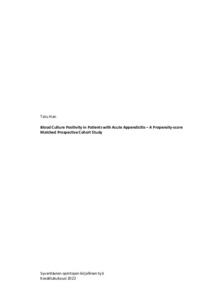Blood Culture Positivity in Patients with Acute Appendicitis – A Propensity-score Matched Prospective Cohort Study
Han, Tatu (2022-01-17)
Blood Culture Positivity in Patients with Acute Appendicitis – A Propensity-score Matched Prospective Cohort Study
Han, Tatu
(17.01.2022)
Julkaisu on tekijänoikeussäännösten alainen. Teosta voi lukea ja tulostaa henkilökohtaista käyttöä varten. Käyttö kaupallisiin tarkoituksiin on kielletty.
avoin
Julkaisun pysyvä osoite on:
https://urn.fi/URN:NBN:fi-fe202201179049
https://urn.fi/URN:NBN:fi-fe202201179049
Tiivistelmä
Acute appendicitis is one of the most common reasons for acute abdominal pain and abdominal infections are the second most common source of sepsis. However, the prevalence of bacteraemia in acute appendicitis is largely unknown. The aim of this study is to assess both prevalence and predictive factors of bacteraemia in acute appendicitis.
In this prospective propensity-score matched cohort study, patients were recruited as part of a prospective observational study assessing appendicitis microbiology in concurrence with two randomized controlled trials on optimization of non-operative treatment for CT-confirmed uncomplicated acute appendicitis. All patients evaluated for enrollment with both a confirmed diagnosis of appendicitis and available blood culture on admission were included in this study. Potential predictive factors of bacteraemia (age, sex, BMI, body temperature, C-reactive protein (CRP), leukocyte count, comorbidities, symptom duration, and appendicitis severity) were assessed. Prevalence of bacteraemia was determined by all available blood cultures followed by propensity-score matching using sex, age, BMI, CRP, leukocyte count, and body temperature of the patients without available blood culture sample.
Out of the 987 patients with appendicitis, 271 patients had available blood culture and the prevalence of bacteraemia was 12% (n=33). Based on propensity score estimation, the prevalence of bacteraemia in the whole prospective appendicitis cohort was 9%. Bacteraemia was significantly more frequent in complicated acute appendicitis (15%; 29/189) compared with uncomplicated acute appendicitis (5%; 4/82) (p=0.015). Male sex (p=0.024) and higher body temperature (p=0.0044) were associated with a higher prevalence of bacteraemia.
In this prospective propensity-score matched cohort study, patients were recruited as part of a prospective observational study assessing appendicitis microbiology in concurrence with two randomized controlled trials on optimization of non-operative treatment for CT-confirmed uncomplicated acute appendicitis. All patients evaluated for enrollment with both a confirmed diagnosis of appendicitis and available blood culture on admission were included in this study. Potential predictive factors of bacteraemia (age, sex, BMI, body temperature, C-reactive protein (CRP), leukocyte count, comorbidities, symptom duration, and appendicitis severity) were assessed. Prevalence of bacteraemia was determined by all available blood cultures followed by propensity-score matching using sex, age, BMI, CRP, leukocyte count, and body temperature of the patients without available blood culture sample.
Out of the 987 patients with appendicitis, 271 patients had available blood culture and the prevalence of bacteraemia was 12% (n=33). Based on propensity score estimation, the prevalence of bacteraemia in the whole prospective appendicitis cohort was 9%. Bacteraemia was significantly more frequent in complicated acute appendicitis (15%; 29/189) compared with uncomplicated acute appendicitis (5%; 4/82) (p=0.015). Male sex (p=0.024) and higher body temperature (p=0.0044) were associated with a higher prevalence of bacteraemia.
